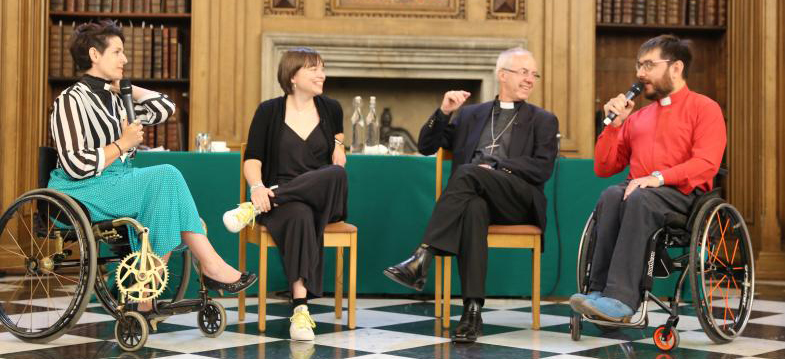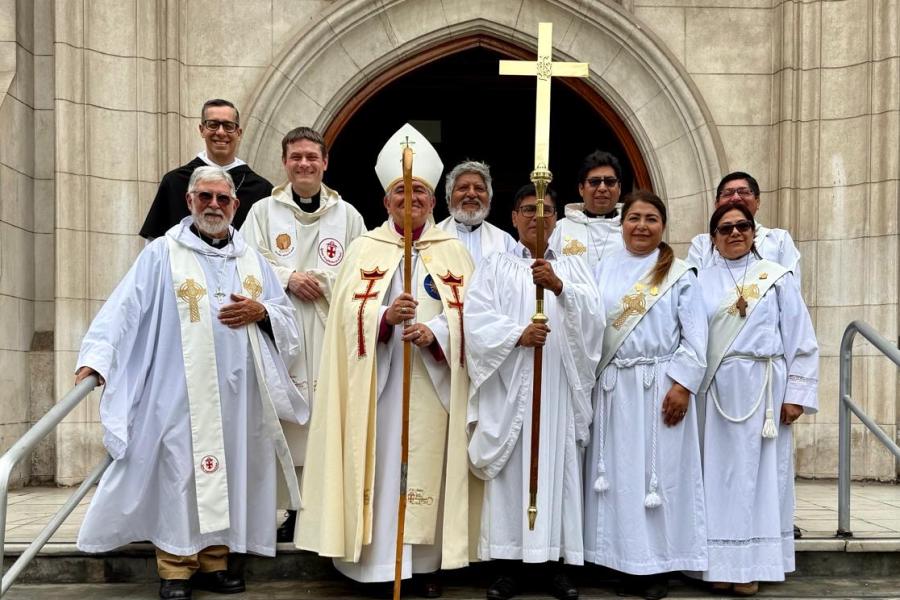
This summer, the Archbishop of Canterbury put on a nationalchurch conference on disabilities in the church. There was a particular focuson being open to exploring vocations to ordained ministry for people withdisabilities. A significant proportion of those present had a disability, and anumber of disabled people, ordained and lay, addressed the conference. One ofthe clergy with a disability who attended was the new vicar of Malvern Link,Phillip Johnson, and hes written a short report recording his impressions. Italso gives food for thought for how we all could do more to be a church that isinclusive, especially of those with disabilities.
You can read more about the conference on the Archbishop of Canterbury's website.
 In July I, as a priest with a disability, together with DougChaplin, attended a conference at Lambeth Palace entitled Value &Belonging on the theme of disability and inclusion within the Church ofEngland. The day was well attended from a number of dioceses and had a varietyof different strands throughout the day.
In July I, as a priest with a disability, together with DougChaplin, attended a conference at Lambeth Palace entitled Value &Belonging on the theme of disability and inclusion within the Church ofEngland. The day was well attended from a number of dioceses and had a varietyof different strands throughout the day.
Archbishop Justin had conceived the day along with RoyMcCloughry (the Church of Englands National Disability advisor) and the Committeefor the Ministry of and among Deaf and Disabled People (CMDDP). The archbishopwas present throughout the day as a speaker and participant.
Some good things about the day
- It happened at all this is the first timethere has ever to my knowledge ever been a conference on disability in theChurch of England at a national level.
- The input from John Swinton (from AberdeenUniversity) on inclusion from a theological perspective was excellent andprovided an interesting exploration of how Christians may understand themselvesbeyond a simple articulation of human rights.
- It bought issues to the archbishops attentionthat he seemed unaware of (particularly the issue of stipendiary clergy beingunable to receive funds from Access to Work or other statutory help as theyare not classed as employees as this is one of the most significant problemsthat disabled clergy face it seemed odd that he didnt know).
- Its the first time Ive ever seen that manydisabled clergy in clerical dress in a room before there is significant powerin seeing people like you in public roles.
Some not so great things about the day
- Even conferences that arent about disabilitymanage to ask whether attendees have any access needs they didnt. There wassignificant quiet grumbling online about this
- There were two toilets for 150 people. Not greatconsidering that disabled people often need the toilet significantly more thanable bodied.
- The anecdotal chat sections were light andaccessible but didnt engage with some of the more complex issues aroundselection or representation.
- There was very little discussion about the roleof the Ministry Division in defining the landscape or DDOs (Directors ofOrdinands) encouraging / not encouraging disabled candidates forward, or of thefinancial costs of training with a disability.
- The layout was tricky to manoeuvre around and anumber of people felt trapped where they were.
Food for further thought
- The archbishop was asked about diocesandisability advisors he said that every diocese had one and was then quitesurprised that most didnt seem to. I dont know if we have a designated personin Worcester.
- There was a lack of statistics and data on theamount of disabled clergy in the CofE this is partly because most dontdisclose it, but also because we dont collect it.
- There could be more training and education forclergy on disability theology and inclusion practice in particular anacceptable theology of healing which disabled people can engage with.
Overall, Im delighted that the day happened but it will beinteresting as to what the next steps will be at a national level, and whetherwe can take any more steps at our local level.
The Revd PhillipJohnson

